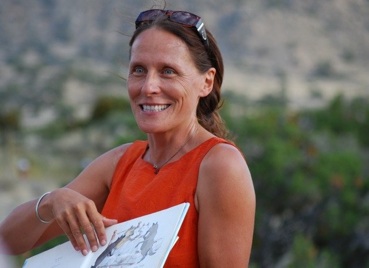In the Press: One with the Lobos-Film to Premier Oct. 28 and 29
 By Tom Travin
By Tom Travin
Elke Duerr’s journey is finally near its end. And yet, it’s just beginning.
For the past couple years, independent filmmaker Duerr has been immersed in “Stories of Wolves: The Lobo Returns,” a documentary about the Mexican gray wolf and its tenuous place in the modern world. Next week audiences will have the opportunity to see her film, in free world premiere showings in Santa Fe and Albuquerque.
For Duerr, a native of Germany who calls the North Valley home, it’s an important way station along a path that appears to have no limits.
“So much has happened (in the last year),” she said. “I thought I would make a film, and that would be it. Well, I’m totally entrenched in this now, and I probably will be until I pass on. It’s a lifelong commitment.”
The film, shot on location in the Gila National Forest, at the Sevilleta National Wildlife Refuge, ranches in Arizona and New Mexico and in upstate New York, focuses on the status of wolves today and the future they face. Duerr talked to ranchers, environmentalists, government officials and others to dispel centuries-old myths about wolves and illustrate how important they are to the cycle of life. “¦
The goal, she said, is “to keep fostering the reconnection of humans to the natural world, because I noticed that it’s our disconnection that’s so destructive. We think we have dominion over the animals and the land, and we are not living with them. We are living above them.”
Since the Mexican Gray Wolf Recovery Program, an offshoot of the 1973 Endangered Species Act, was begun, it has been a center of controversy. The first wolves were released into the wild in 1998 in parts of southeastern Arizona and southwestern New Mexico. The move was immediately met with opposition from ranchers, who claimed that depredation of their livestock would soar.
That hasn’t been the case, but even one cattle death is cause for concern and even outrage on the part of people who make a living off their livestock. And then there is the larger question of land use, of whether leasing federal land for grazing gives them the right to control wildlife, including wolves.
Today there are about 50 Mexican gray wolves in the wild, a number that fluctuates every year depending on the number of pups born and how many are killed by poachers. The decision in July by the N.M. Department of Game & Fish to again allow trapping in the wolves’ territory has generated vehement public sentiment against the practice in general and how it relates to wolves in particular.
To Duerr — whose interest clearly lies in protecting wolves but has made a decidedly nonconfrontational film that, instead of pointing fingers, looks for solutions — it comes down to a simple matter of sharing.
“I have learned that there is a whole other way of being, of coexisting, that we could implement,” she said. “And that also, when we do connect, it’s not just good for nature and the animals, it’s good for ourselves as well. We don’t feel lost anymore. We belong. “¦
“As long as we are separate, we will not care for the whole.”
Duerr said that she met immediate resistance from some ranchers she talked to because the issue is so polarized, but others were more accommodating.
“There’s only a few I found that really wanted to work with the wolves,” she said. “Others have their opinion right away, and that really deters them, I feel, from making it work. “¦
The bottom line is that for the wolves to survive, she believes, it will take a concerted effort by all parties involved. Ranchers need their fear of livestock losses allayed. Environmentalists need to know that as protected wildlife, wolves will be left alone to grow their numbers.
In other words, we’re all in this together.
“One of the things to consider is not only is the Earth going to be home to all the future generations, but she already is home to us now, that love the wild ones, have made a space for them, have an understanding and have found a way to coexist,” she said. “So now we have to navigate. “¦
“That’s another thing I want to accomplish: first education, but also inspiration. You can do it. I did it. I wasn’t overfunded or privileged or whatever. We all can now draw together. We can all make our love known. Because it’s not anger against, it’s love for, that will propel it.”
********************************************************************
To read the full article published in the Albuquerque Journal, click here (non-subscribers can use the free trial access button).
Photograph of Elke Duerr courtesy of Wild Wolf Films



